
2 September 2024
Jerome Powell’s Jackson Hole speech sealed a September rate cut. The only question now seems to be whether it will be a 0.25% or a 0.50% move, with labour market developments likely to be the determining factor, given the line that the Fed does not “seek or welcome further cooling in labour market conditions”.
Many global FX markets performed well in August as investors ramped up expectations of Fed policy easing, weighing on the US dollar.
Recent macro data in China continues to point to an uneven recovery, potentially putting this year’s ~5% real growth target at risk.
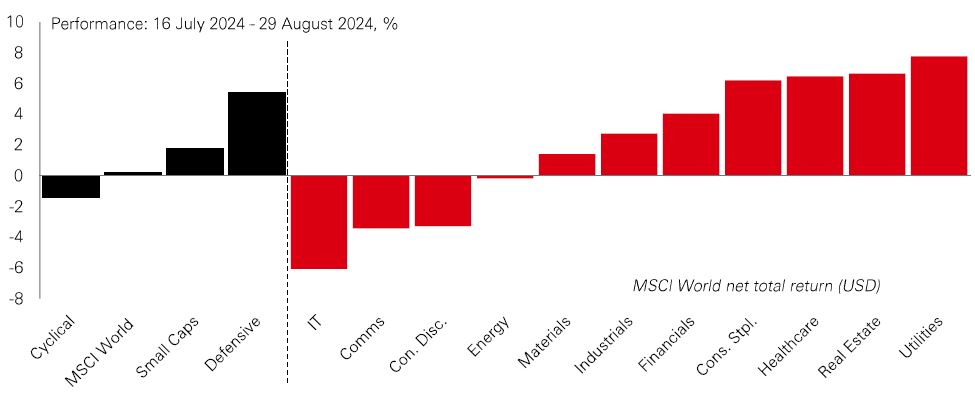
As summer holidays draw to a close, it’s not just suitcases we are unpacking. Last month’s ‘market tantrum’ and rapid recovery deserve scrutiny as the rebound masks some important shifts in sectoral performance.
Through 2023 and for the most part of this year, momentum has been concentrated in stocks riding the AI/technology megatrend. But since July, we’ve had some mixed profits news from the mega-cap tech names, with tech beginning to look like a ‘wobbly trade’. And there was more of that last week after the Q2 earnings results from Nvidia, which despite topping forecasts, failed to impress the market. Stretched tech sector valuations are proving to be a challenge.
Since the market peak in mid-July—amid rising recession worries that sparked August’s bout of volatility—the winners have been out-of-favour defensive and rate-sensitive sectors like utilities, real estate (see Market Spotlight), consumer staples and healthcare. This broadening out of market performance echoes what happened in Q1 when value sectors, like industrials, were holding their own versus quality growth.
What comes next? Investors are getting used to dramatic narrative changes in markets. A complex economic environment and data dependent central bankers have made that par for the course. If central bankers can secure a
soft-ish landing, the ‘broadening out’ theme can become backable again for investors in H2.
Heightened expectations of imminent US rate cuts have boosted the performance of global listed real estate over the summer. The FTSE Nareit All Equity REITs Index has made double-digit gains over the past two months. And even after this rally, the sector still offers a valuation discount to other asset classes. Dividend yields from global real estate equities stand at a premium to both wider equities and developed market government bonds.
With the exception of parts of the office sector, global listed real estate continues to be supported by solid tenant demand and high occupancy levels, which could feed into future dividend growth, and provide a basis for healthy total returns.
Whilst uncertainty over the timing of rate cuts has previously been a drag on sector sentiment, private real estate capital markets are showing signs of re-opening and investment volumes are expected to pick up during the second half of the year.
The value of investments and any income from them can go down as well as up and investors may not get back the amount originally invested. Past performance does not predict future returns. The level of yield is not guaranteed and may rise or fall in the future.
This information shouldn't be considered as a recommendation to buy or sell specific sector/stocks mentioned. Any views expressed were held at the time of preparation and are subject to change without notice. While any forecast, projection or target where provided is indicative only and not guaranteed in any way. Source: HSBC Asset Management. Macrobond, Bloomberg. Data as at 11.00am UK time 30 August 2024.
Jerome Powell’s Jackson Hole speech sealed a September rate cut. The only question now seems to be whether it will be a 25bp or a 50bp move, with labour market developments likely to be the determining factor, given the line that the Fed does not “seek or welcome further cooling in labour market conditions”.
The market is pricing about a one-third chance of a 50bp cut in September, 100bp of easing by year-end and around 225bp by end-2025.
Moreover, market pricing incorporates a range of possible outcomes, including some probability of a recession. The last three recessions (excluding Covid) have seen 400-500bp of cuts over an 18-month period. So, there is plenty of scope for rate expectations to shift lower if the economy slows quicker than expected.
Yields are still elevated and August’s market turbulence proved that Treasuries haven’t lost their role as a hedge against equity market volatility.
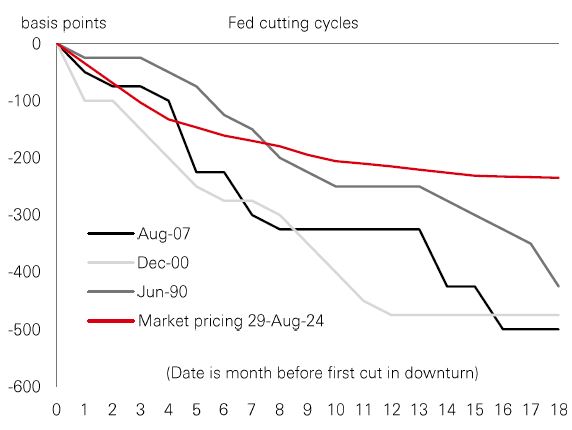
Many global FX markets performed well in August as investors ramped up expectations of Fed policy easing, weighing on the US dollar. Within the EM FX universe, Asian currencies have done particularly well, especially in ASEAN (the Malaysian ringgit and Indonesian rupiah are up over 5% month-to-date). But this is not just a dollar story – local factors have provided a boost too.
In Malaysia, the ringgit has enjoyed a tailwind from administrative moves to boost conversion of FX proceeds into local currency, and its economy has staged a strong, broad, recovery this year. There are also signs that it’s benefitting from a broadening of the global tech upcycle, as well as rising foreign direct investment.
The central scenario is for the USD to decline further as the Fed eases policy, benefitting EM FX which offers a yield advantage. EM currencies also look cheap. EM FX appreciation would provide an important tailwind to returns for international investors in local-currency EM assets. But varied country-level performance is a reminder that a diversified approach to EM investing is crucial.
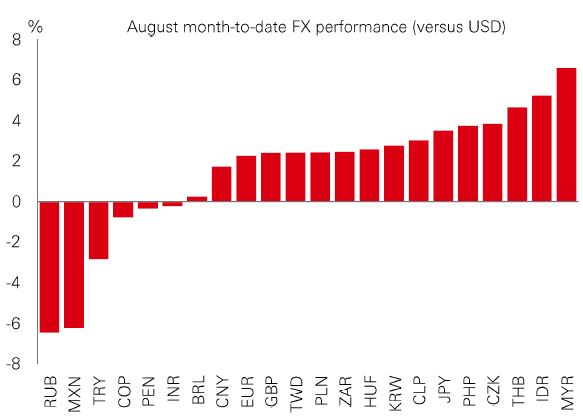
Recent macro data in China continues to point to an uneven recovery, potentially putting this year’s ~5% real growth target at risk.
Solid exports and developments in advanced manufacturing have been cushioning the growth slowdown, but soft consumer demand sets the economy up to be more vulnerable to global demand shocks and rising protectionism. The domestic supply-demand imbalance has resulted in excess capacity and fierce competition in some sectors, weighing on corporate profits and exerting deflationary pressures in the economy.
Some analysts think the uneven recovery points to a need for more policy action and forceful implementation to restore confidence and fundamentally reflate the economy. This policy support could be a catalyst for EM stock market outperformance. Meanwhile, divergent sectoral growth paths reflect policy priorities for economic transformation toward quality and innovation-led growth, which creates opportunities in sectors prioritised for long-term development.
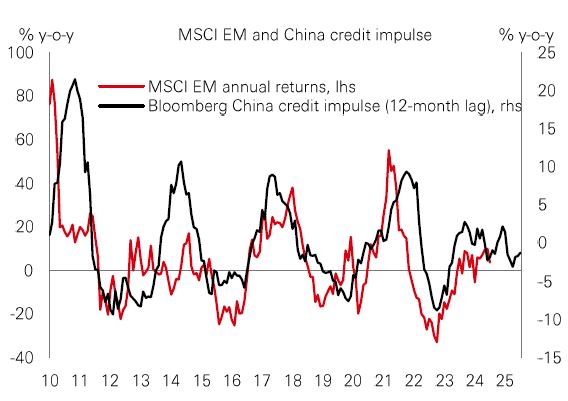
Past performance does not predict future returns. The level of yield is not guaranteed and may rise or fall in the future. This information shouldn't be considered as a recommendation to buy or sell specific sector/stocks mentioned. Any views expressed were held at the time of preparation and are subject to change without notice. Source: HSBC Asset Management. Macrobond, Bloomberg, Datastream. Data as at 11.00am UK time 30 August 2024.
| Last week |
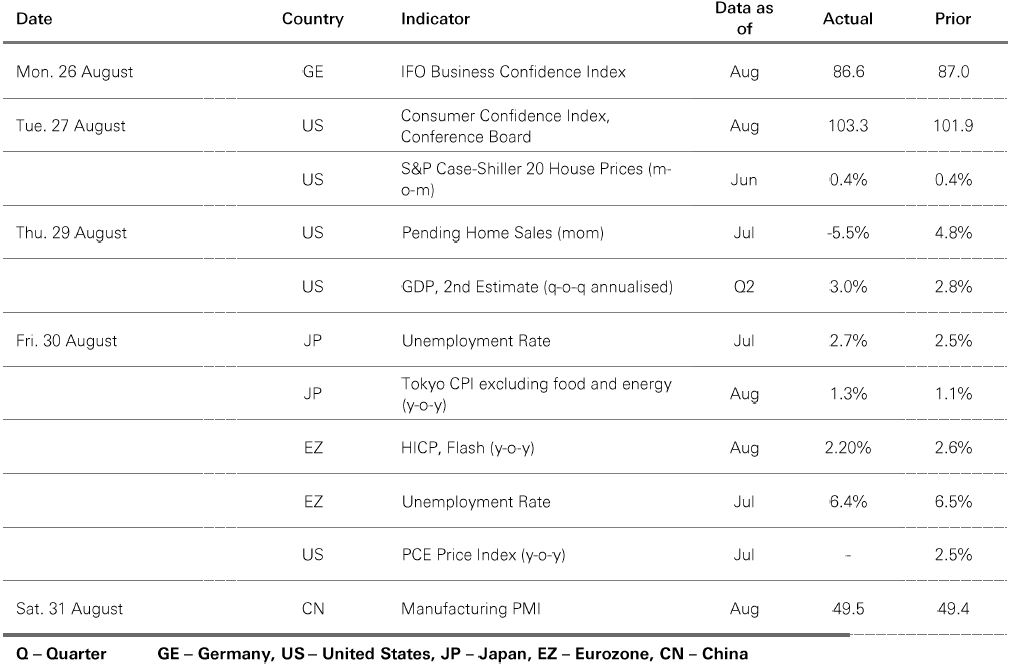
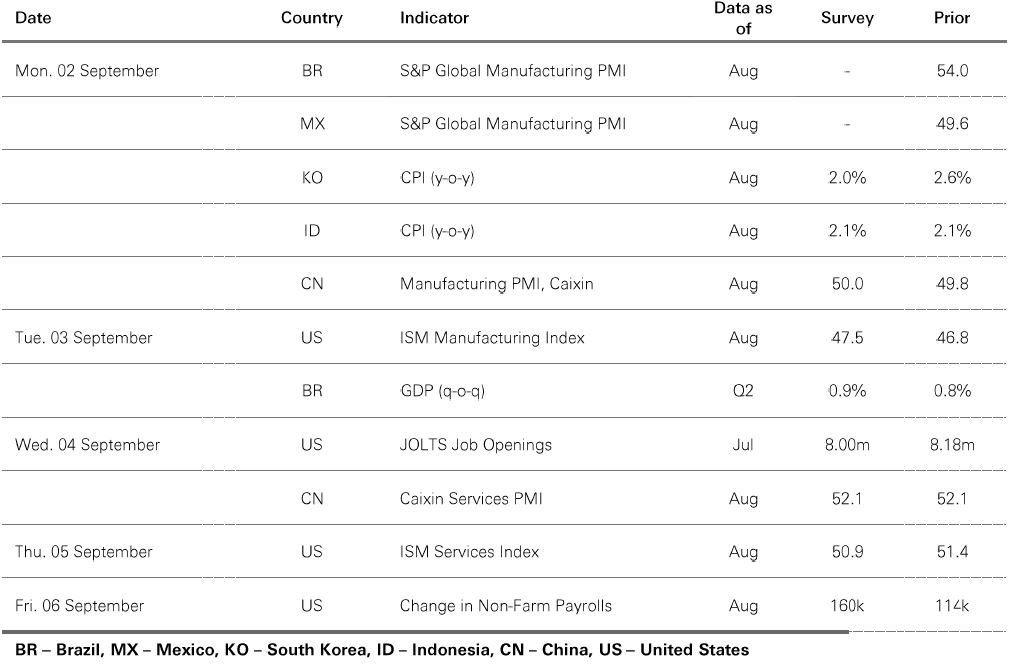
Source: HSBC Asset Management. Data as at 11.00am UK time 30 August 2024. This information shouldn't be considered as a recommendation to buy or sell specific sector/stocks mentioned. Any views expressed were held at the time of preparation and are subject to change without notice.
Risk assets were resilient as investors digested Q2 results from Nvidia, the US’s largest chip maker and a major focus in the current AI/tech megatrend. Core government bonds were range-bound ahead of key US employment data, with the DXY US dollar index pausing for breath after recent declines. Despite some volatility in tech stocks, US equity markets were on course to finish broadly flat. The Stoxx Euro 600 index reached new highs, and Japan’s Nikkei 225 edged higher as the yen softened versus the US dollar. In emerging markets, Korea’s Kospi index was buffeted by US tech weakness, but Taiwan’s weighted SE index was resilient. Mainland China’s Shanghai composite index was little changed, while India’s Sensex index rose to a new all-time high. In commodities, oil prices were supported by supply worries in Libya. Gold remains close to a record high, with copper also edging higher.
Related Insights

Despite media headlines about the US election, investors should focus on earnings, rates...[1 Aug]

As expected, the FOMC kept rates unchanged at the July meeting. The Fed funds rate remains...[1 Aug]


Market expectations for Fed rate cuts have been on a roller-coaster ride, swinging from too...[23 May]
This document or video is prepared by The Hongkong and Shanghai Banking Corporation Limited (‘HBAP’), 1 Queen’s Road Central, Hong Kong. HBAP is incorporated in Hong Kong and is part of the HSBC Group. This document or video is distributed and/or made available by HSBC Bank Canada (including one or more of its subsidiaries HSBC Investment Funds (Canada) Inc. (“HIFC”), HSBC Private Investment Counsel (Canada) Inc. (“HPIC”) and HSBC InvestDirect division of HSBC Securities (Canada) Inc. (“HIDC”)), HSBC Bank (China) Company Limited, HSBC Continental Europe, HBAP, HSBC Bank (Singapore) Limited, HSBC Bank Middle East Limited (UAE), HSBC UK Bank Plc, HSBC Bank Malaysia Berhad (198401015221 (127776-V))/HSBC Amanah Malaysia Berhad (20080100642 1 (807705-X)), HSBC Bank (Taiwan) Limited, HSBC Bank plc, Jersey Branch, HSBC Bank plc, Guernsey Branch, HSBC Bank plc in the Isle of Man, HSBC Continental Europe, Greece, The Hongkong and Shanghai Banking Corporation Limited, India (HSBC India), HSBC Bank (Vietnam) Limited, PT Bank HSBC Indonesia (HBID), HSBC Bank (Uruguay) S.A. (HSBC Uruguay is authorised and oversought by Banco Central del Uruguay), HBAP Sri Lanka Branch, The Hongkong and Shanghai Banking Corporation Limited – Philippine Branch, and HSBC FinTech Services (Shanghai) Company Limited (collectively, the “Distributors”) to their respective clients. This document or video is for general circulation and information purposes only.
The contents of this document or video may not be reproduced or further distributed to any person or entity, whether in whole or in part, for any purpose. This document or video must not be distributed in any jurisdiction where its distribution is unlawful. All non-authorised reproduction or use of this document or video will be the responsibility of the user and may lead to legal proceedings. The material contained in this document or video is for general information purposes only and does not constitute investment research or advice or a recommendation to buy or sell investments. Some of the statements contained in this document or video may be considered forward looking statements which provide current expectations or forecasts of future events. Such forward looking statements are not guarantees of future performance or events and involve risks and uncertainties. Actual results may differ materially from those described in such forward-looking statements as a result of various factors. HBAP and the Distributors do not undertake any obligation to update the forward-looking statements contained herein, or to update the reasons why actual results could differ from those projected in the forward-looking statements. This document or video has no contractual value and is not by any means intended as a solicitation, nor a recommendation for the purchase or sale of any financial instrument in any jurisdiction in which such an offer is not lawful. The views and opinions expressed are based on the HSBC Global Investment Committee at the time of preparation, and are subject to change at any time. These views may not necessarily indicate HSBC Asset Management‘s current portfolios’ composition. Individual portfolios managed by HSBC Asset Management primarily reflect individual clients’ objectives, risk preferences, time horizon, and market liquidity.
The value of investments and the income from them can go down as well as up and investors may not get back the amount originally invested. Past performance contained in this document or video is not a reliable indicator of future performance whilst any forecasts, projections and simulations contained herein should not be relied upon as an indication of future results. Where overseas investments are held the rate of currency exchange may cause the value of such investments to go down as well as up. Investments in emerging markets are by their nature higher risk and potentially more volatile than those inherent in some established markets. Economies in emerging markets generally are heavily dependent upon international trade and, accordingly, have been and may continue to be affected adversely by trade barriers, exchange controls, managed adjustments in relative currency values and other protectionist measures imposed or negotiated by the countries with which they trade. These economies also have been and may continue to be affected adversely by economic conditions in the countries in which they trade. Investments are subject to market risks, read all investment related documents carefully.
This document or video provides a high level overview of the recent economic environment and has been prepared for information purposes only. The views presented are those of HBAP and are based on HBAP’s global views and may not necessarily align with the Distributors’ local views. It has not been prepared in accordance with legal requirements designed to promote the independence of investment research and is not subject to any prohibition on dealing ahead of its dissemination. It is not intended to provide and should not be relied on for accounting, legal or tax advice. Before you make any investment decision, you may wish to consult an independent financial adviser. In the event that you choose not to seek advice from a financial adviser, you should carefully consider whether the investment product is suitable for you. You are advised to obtain appropriate professional advice where necessary.
The accuracy and/or completeness of any third party information obtained from sources which we believe to be reliable might have not been independently verified, hence Customer must seek from several sources prior to making investment decision.
Important Information about HSBC Global Asset Management (Canada) Limited (“AMCA”)
HSBC Asset Management is a group of companies, including AMCA, that are engaged in investment advisory and fund management activities, which are ultimately owned by HSBC Holdings plc. AMCA is a wholly owned subsidiary of, but separate entity from, HSBC Bank Canada.
Important Information about HSBC Investment Funds (Canada) Inc. (“HIFC”)
HIFC is the principal distributor of the HSBC Mutual Funds and offers the HSBC Mutual Funds and/or the HSBC Pooled Funds through the HSBC World Selection® Portfolio service. HIFC is a subsidiary of AMCA, and indirect subsidiary of HSBC Bank Canada, and provides its products and services in all provinces of Canada except Prince Edward Island. Mutual fund investments are subject to risks. Please read the Fund Facts before investing.
®World Selection is a registered trademark of HSBC Group Management Services Limited.
Important Information about HSBC Private Investment Counsel (Canada) Inc. (“HPIC”)
HPIC is a direct subsidiary of HSBC Bank Canada and provides services in all provinces of Canada except Prince Edward Island. The Private Investment Counsel service is a discretionary portfolio management service offered by HPIC. Under this discretionary service, assets of participating clients will be invested by HPIC or its delegated portfolio manager, AMCA, in securities, including but not limited to, stocks, bonds, mutual funds, pooled funds and derivatives. The value of an investment in or purchased as part of the Private Investment Counsel service may change frequently and past performance may not be repeated.
Important Information about HSBC InvestDirect (“HIDC”)
HIDC is a division of HSBC Securities (Canada) Inc., a direct subsidiary of, but separate entity from, HSBC Bank Canada. HIDC is an order execution only service. HIDC will not conduct suitability assessments of client account holdings or of the orders submitted by clients or from anyone authorized to trade on the client’s behalf. Clients have the sole responsibility for their investment decisions and securities transactions.
Important Information about the Hongkong and Shanghai Banking Corporation Limited, India (“HSBC India”)
HSBC India is a branch of The Hongkong and Shanghai Banking Corporation Limited. HSBC India is a distributor of mutual funds and referrer of investment products from third party entities registered and regulated in India. HSBC India does not distribute investment products to those persons who are either the citizens or residents of United States of America (USA), Canada, Australia or New Zealand or any other jurisdiction where such distribution would be contrary to law or regulation.
The following statement is only applicable to HSBC Bank (Taiwan) Limited with regard to how the publication is distributed to its customers: HSBC Bank (Taiwan) Limited (“the Bank”) shall fulfill the fiduciary duty act as a reasonable person once in exercising offering/conducting ordinary care in offering trust services/ business. However, the Bank disclaims any guarantee on the management or operation performance of the trust business.
The following statement is only applicable to PT Bank HSBC Indonesia (“HBID”): PT Bank HSBC Indonesia (“HBID”) is licensed and supervised by Indonesia Financial Services Authority (“OJK”). Customer must understand that historical performance does not guarantee future performance. Investment product that are offered in HBID is third party products, HBID is a selling agent for third party product such as Mutual Fund and Bonds. HBID and HSBC Group (HSBC Holdings Plc and its subsidiaries and associates company or any of its branches) does not guarantee the underlying investment, principal or return on customer investment. Investment in Mutual Funds and Bonds is not covered by the deposit insurance program of the Indonesian Deposit Insurance Corporation (LPS).
THE CONTENTS OF THIS DOCUMENT OR VIDEO HAVE NOT BEEN REVIEWED BY ANY REGULATORY AUTHORITY IN HONG KONG OR ANY OTHER JURISDICTION.
YOU ARE ADVISED TO EXERCISE CAUTION IN RELATION TO THE INVESTMENT AND THIS DOCUMENT OR VIDEO. IF YOU ARE IN DOUBT ABOUT ANY OF THE CONTENTS OF THIS DOCUMENT OR VIDEO, YOU SHOULD OBTAIN INDEPENDENT PROFESSIONAL ADVICE.
© Copyright 2024. The Hongkong and Shanghai Banking Corporation Limited, ALL RIGHTS RESERVED.
No part of this document or video may be reproduced, stored in a retrieval system, or transmitted, on any form or by any means, electronic, mechanical, photocopying, recording or otherwise, without the prior written permission of The Hongkong and Shanghai Banking Corporation Limited.
Important information on sustainable investing
“Sustainable investments” include investment approaches or instruments which consider environmental, social, governance and/or other sustainability factors (collectively, “sustainability”) to varying degrees. Certain instruments we include within this category may be in the process of changing to deliver sustainability outcomes.
There is no guarantee that sustainable investments will produce returns similar to those which don’t consider these factors. Sustainable investments may diverge from traditional market benchmarks.
In addition, there is no standard definition of, or measurement criteria for sustainable investments, or the impact of sustainable investments (“sustainability impact”). Sustainable investment and sustainability impact measurement criteria are (a) highly subjective and (b) may vary significantly across and within sectors.
HSBC may rely on measurement criteria devised and/or reported by third party providers or issuers. HSBC does not always conduct its own specific due diligence in relation to measurement criteria. There is no guarantee: (a) that the nature of the sustainability impact or measurement criteria of an investment will be aligned with any particular investor’s sustainability goals; or (b) that the stated level or target level of sustainability impact will be achieved.
Sustainable investing is an evolving area and new regulations may come into effect which may affect how an investment is categorised or labelled. An investment which is considered to fulfil sustainable criteria today may not meet those criteria at some point in the future.